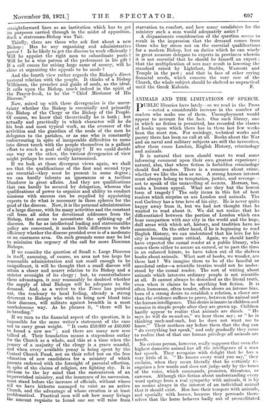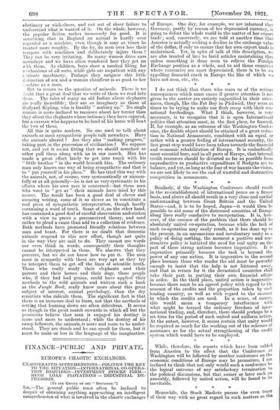ANIMALS AND THE LIMITATIONS OF SPEECH.
PUBLIC libraries have lately—so wo read in the Press --noted a considerable increase in the number of readers who make use of them. Unemployment would appear to account for the fact. One such library, one in which no fiction is permitted, has recorded the classes of books upon which there has in these last few weeks been the most run. For sociology, technical works and poetry there has been no call at all. Books about the War and on naval and military subjects are still the favourites, after them come London, English History, criminology and animals.
It is natural that men should want to read some informing comment upon their own greatest experience ; natural, also, that where fiction is forbidden criminology should find readers. There is a romance about crime, whether we like the idea or no. A strong human interest must always belong to temptation, justice, and revenge— not to speak of the unravelling of secrets. Horrors, too, make a human appeal. What are they but the lowest form of tragedy I The only items in this list of best readers which surprise us are London and animals. The real Cockney has a true love of his city. He is never quite happy away from it, but we had not thought that he wanted to read about it. We did not realize that ho differentiated between the portion of London which can bear comparison with any city in the world and the huge, dull areas with which art, history, and tradition have no connexion. On the other hand, if he is beginning to read English History, we can understand that his love for his city is becoming more critical. Again, we should hardly have expected the casual reader at a public library, who comes there either to amuse an earned, or to pass the time in an enforced leisure, to have taken out of the shelves books about animals. What sort of books, we wonder, are these last ? We imagine them to be of the fanciful or anecdotal order—a scientific treatise would not be under- stood by the casual reader. The sort of writing about animals which interests ordinary people is not scientific at all. It cannot always be described as the literal truth, even when it claims to be anything but fiction. It is often humorous, often tender, often shows an intense bias, born of a strong desire to establish a relation, a closer one than the evidence suffices to prove, between the animal and the human intelligence. This desire is innate in children and remains in simple people after they are grown up. Children hardly appear to realize that animals are dumb. " He says he will do so-and-so," we hear them say ; or " he is thinking such-and-such, but he does not want me to know." Their mothers say before them that the dog can " do everything but speak," and only gradually they come to realize that of that one human privilege all animals are bereft.
No serious person, however, really supposes that even the highest domestic animal has all the intelligence of a man bar speech. They recognize with delight that ho has a very little of it. He knows every word you say," they exclaim, when they mean literally that he certainly re- cognizes a few words and does not judge only by the tones of the voice, which commands, promises, threatens, or caresses. Although this fiction about understanding every word springs from a real sympathy with animals, it is by no means always in the interest of an individual animal that it should exist. Men lose their tempers with animals, and specially with horses, because they persuade them- selves that the horse behaves badly out of premeditated obstinacy or wickedness, and not out of sheer failure to understand what is wanted of it. On the whole, however, the popular fiction makes immensely for good. It is something that in England an animal is hardly ever regarded as a machine, even though it may at times be treated more roughly. By the by, do men ever lose their tempers with machines and deliberately injure them ? They can be very irritating. So many women drive cars nowadays and we have often wondered how they get on with them. As children, boys show a marked liking for n echanisms of all sorts, while girls are impatient with any Etricate machinery. Perhaps they outgrow this little distinction of sex and a woman chauffeur is as good to her lachine as a man.
But to return to the question of animals. There is no Joubt that a great deal that we write of them we read into them. The tales of many an old Indian about elephants are really incredible ; they are as imaginary as those of Rudyard Kipling, who is frankly " making up." No single woman is more inclined to romance about her terrier than they about the elephants whose intimacy they have enjoyed, but a carman who happens to be fond of his horse will beat the two of them.
All this is quite modern. No one used to talk about animals as most sympathetic people talk nowadays. Have the animals altered ? Are they also " making progress," taking part in the procession of civilization ? We suppose not, and yet it seems fitting that we should somehow or other pull them along with us in our march. Man has made a great effort lately to get into touch with his " little brother " in the world beneath him. The ordinary man only knows one way of being sympathetic and that is to " put yourself in his place." He has tried this way with the animals, not, of course, very systematically or success- fully or at all generally—he is not so very systematic in his efforts where his own race is concerned—but those men who want to " get at " their animals have tried by this means. The result has been a good deal of clever and amusing writing, some of it so clever as to constitute a real piece of sympathetic interpretation, though hardly containing a word of truth. Some of it, on the other hand, has contained a good deal of careful observation undertaken with a view to prove a preconceived theory, and used rather to plead a cause than add to a collection of evidence. Both methods have promoted friendly relations between man and beast. For there is no doubt that domestic animals respond to this new effort, though not quite in the way they are said to do. They cannot use words nor even think in words, consequently their thoughts cannot be interpreted in them. We observe that they perceive, but we do not know how to put it. The men most in sympathy with them are very apt as they try to interpret them to get off the lines of scientific truth. Those who really study their elephants and their parrots and their horses and their dogs, those people who, if they had had genius, could have applied their methods to the wild animals and written such a book as the Jungle Book, really know more about this great subject of interest, animal psychology, than the dry scientists who ridicule them. The significant fact is that there is an immense deal to learn, not that the methods of setting that learning down are often ridiculous. It seems as though in the great march onwards in which all but the pessimists believe that man is engaged his destiny is more and more to understand ; while the destiny of his camp followers, the animals, is more and more to be under- stood. They are dumb and he can speak for them, but it must be more or less in the language of the imagination.











































 Previous page
Previous page